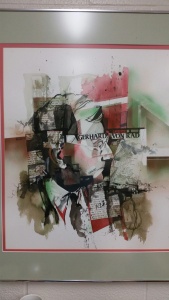A wandering Aramean was my father; and he went down into Egypt and sojourned there, few in number; and there he became a nation, great, mighty, and populous.
Deuteronomy 26:5
Tributaries. My daily navigations through the classroom drift me down meandering tributaries that often appear disconnected from one another. But many times, connections seem to emerge anyway, and I enjoy examining the links. Today in art history, we explored the art and ideas of ancient Byzantium, and I could not resist opening my Powerpoint with the caption: “No Country for Old Men.” As expected, the students verbally jumped onto the famous Coen brothers film. After they got that out of their system (and no, I’m not convinced they figured out what the title meant in relation to the film’s plot), I introduced them to William Butler Yeats’s poem “Sailing to Byzantium,” with its opening words: “That is no country for old men.”
With a few lines from the poem, I tried to prod them into the exotic world of the Greek Christians who populated the eastern half of a decaying Roman Empire, managing to build a magnificent empire of their own, rich in philosophy, theology, architecture and mosaics–all combining to form Art. This Byzantine world would stretch over a millenium before the collapse of Constantinople in 1453. The centuries of the empire no doubt swept by like a turbulent river, with citizens daily flowing in that current, never really seeing the rising edifice of this Art at their core that would endure for all eternity. They were no doubt caught up in their own frantic life details, as we are today.
Caught in that sensual music all neglect
Monuments of unageing intellect.
My observation could be wrong, but I feel that our current population is busy with frenetic details, always moving, always alluring, and most often unfulfilling. I always return to that mantra of Matthew Arnold:
Art still has truth, take refuge there.
As the classes rolled by today, I felt that I was fleshing out the notion of creativity, beautifully stated by Arthur Koestler:
Creativity: a type of learning process where the teacher and pupil are located in the same individual.
When my classes finally broke, I felt the need to pursue my own personal education for awhile, and found myself reaching for volumes by Gerhard von Rad, an existential theologian of the 20th century who was frequently brought up in my graduate school seminars. I pulled three of his works from my classroom shelves on Old Testament Theology, Genesis and Deuteronomy, and began reading at my desk, postponing lunch for awhile. Von Rad constructed a theory known as Credo, taking a text from Deuteronomy (I cited the first verse above) and arguing that this historical confession of the ancient Hebrews predated the literary sources behind the first six books of their Bible. The narrative sets forth Jacob (Israel) as a “wandering Aramean” who sojourned into Egypt as a small family, and eventually grew into a great and mighty nation.
For years, I have carried that passage in my consciousness, focussing on that wandering, odyssey motif. It was easy to do, connecting this Credo with Homer’s Odyssey, Joyce’s Ulysses, etc. And still I work at tracing out those threads of our existence on this planet set forth in poems, essays and novels as restless spirits journeying through life, zigzagging so to speak, like Emerson’s reference to the ship tacking back and forth, eventually resolving these jerky movements into a straight line that points successfully toward one’s destiny. Re-thinking Byzantium, I could see those patterns as the ethos of ancient Greece, Rome and Byzantium evolved in jerky, shifting paths, trying to find a workable way to live on this earth.
But then things began to shift as I re-thought what was said yesterday in the Philosophy class while looking over Husserl’s phenomenology, namely the perpetual argument that there is more than one way to interpret a subject under investigation. As I looked at this Credo in Deuteronomy again, I gazed past the “wandering” notion of Jacob/Israel, and focused more directly on his humble, simple origin and richly complex destiny. He entered Egypt small in number and emerged as a mighty nation. I then looked back at ancient Greece, Rome and Byzantium, chuckling at the old adage “Rome wasn’t built in a day,” and marveled at the rising edifice of Art over the millenia. Composting takes time. Evolution takes time. What begins as small and simple eventually grows large and complex. What appears to moving along in jerky fashion is actually making progress toward a goal.
Where is all of this going? Well, I live in the world of education, that is my profession. When young and full of gas, I would often sit in my pastor’s study and look across that vast array of volumes in his sprawling library. I would then helplessly say to this man, nearing his retirement, “I feel like I know nothing!” In response, he would always just beam and say, “It will come. Just give it time. Give it years.” As I pursued my education, I worked at acquiring vast numbers of facts to spill out onto exams, hoping to pass. But it wasn’t until I reached the classroom that I finally found my niche: assembling these diverse ideas into a model that works for me. My personal journals began in 1987 (I have over 130 volumes now), and they just overflow with notes from what I’ve read, thought and tried to put into a meaningful written word over the years. And now I have that privilege, daily, of assembling these scraps of data, these bundles of printed manuscripts, and setting them on fire in class, hoping enough students will gather round to watch them burn, hoping for some kind of Phoenix to rise in the midst.
Thanks for reading.
I paint in order to remember.
I journal when I feel alone.
I blog to remind myself that I am not really alone.

